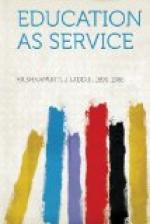Discrimination is wanted in the choice of subjects and in the way in which they are taught. First in importance come religion and morals, and these must not only be taught as subjects but must be made both the foundation and the atmosphere of school life, for these are equally wanted by every boy, no matter what he is to do later in life. Religion teaches us that we are all part of One Self, and that we ought therefore help one another. My Master said that people “try to invent ways for themselves which they think will be pleasant for themselves, not understanding that all are one, and that therefore only what the One wills can ever be really pleasant for anyone.” And He also said: “You can help your brother through that which you have in common with him, and that is the Divine life.” To teach this is to teach religion, and to live it is to lead the religious life.
At present the value of the set moral teaching is largely made useless by the arrangements of the school. The school day should always open with something of the nature of a religious service, striking the note of a common purpose and a common life, so that the boys, who are all coming from different homes and different ways of living may be tuned to unity in the school. It is a good plan to begin with a little music or singing so that the boys, who often come rushing in from hastily taken food, may quiet down and begin the school day in an orderly way. After this should come a prayer and a very short but beautiful address, placing an ideal before the boys.
But if these ideals are to be useful, they must be practised all through the school day, so that the spirit of the religious period may run through the lessons and the games. For example, the duty of the strong to help the weak is taught in the religious hour, and yet for the rest of the day the strong are set to outstrip the weak, and are given valuable prizes for their success in doing so. These prizes make many boys jealous and discourage others, they stimulate the spirit of struggle. The Central Hindu College Brotherhood has for its motto: “The ideal reward is an increased power to love and to serve.” If the prizes for good work and conduct and for helping others were positions of greater trust and power of helping, this motto would be carried out. In fact, in school honour should be given to character and helpfulness rather than to strength of mind and body; strength ought to be trained and developed, but not rewarded for merely outstripping the weak. Such a school life will send out into the world men who will think more of filling places of usefulness to the nation than of merely gaining money and power for themselves.




